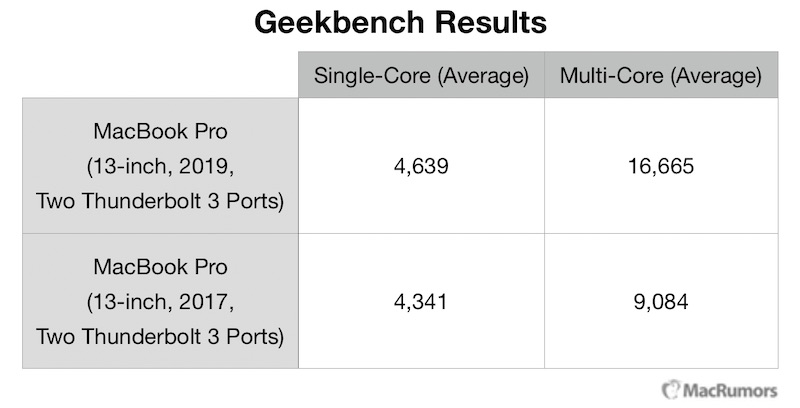
Geekbench Four scores point out the bottom 2019 mannequin with an Eighth-generation 1.4GHz quad-core Core i5 processor has up to a 6.eight % enhance in single-core efficiency, and up to 83.Four % quicker multi-core efficiency, in contrast to the bottom 2017 mannequin with a Seventh-generation 2.3GHz dual-core Core i5 processor.
Specifically, the 2019 mannequin has common single-core and multi-core scores of 4,639 and 16,665 respectively based mostly on eight Geekbench outcomes, whereas the 2017 mannequin averages 4,341 for single-core and 9,084 for multi-core.

The new entry-level 13-inch MacBook Pro is powered by Intel’s Core i5-8257U processor, which seems to be a customized variation of its Core i5-8250U processor designed for Apple. The 15W chip is a part of the Coffee Lake household and has a max Turbo Boost frequency of up to 3.9GHz.
The pocket book can be upgraded to an Eighth-generation 1.7GHz quad-core Core i7 processor. This configuration makes use of Intel’s Core i7-8557U, which is likewise believed to be a customized variation of its Core i7-8550U processor, with a TDP of 15W and a max Turbo Boost frequency of up to 4.5GHz.
Only one Geekbench consequence is out there for the 1.7GHz configuration up to now with single-core and multi-core scores of 4,835 and 15,515 respectively. There is room for variance right here as extra outcomes come in, however this may be a efficiency enhance of up to round 60 % in contrast to the equal 2017 mannequin.
Apple advertises the brand new entry-level 13-inch MacBook Pro as “two times more powerful” than the earlier technology. The benchmarks method this at up to 83 %, however efficiency in real-world utilization will differ.
Apple didn’t replace the entry-level 13-inch MacBook Pro in 2018, which is why 2017 fashions function the previous-generation comparisons.
https://www.macrumors.com/2019/07/11/base-2019-13-inch-macbook-pro-benchmarks/
